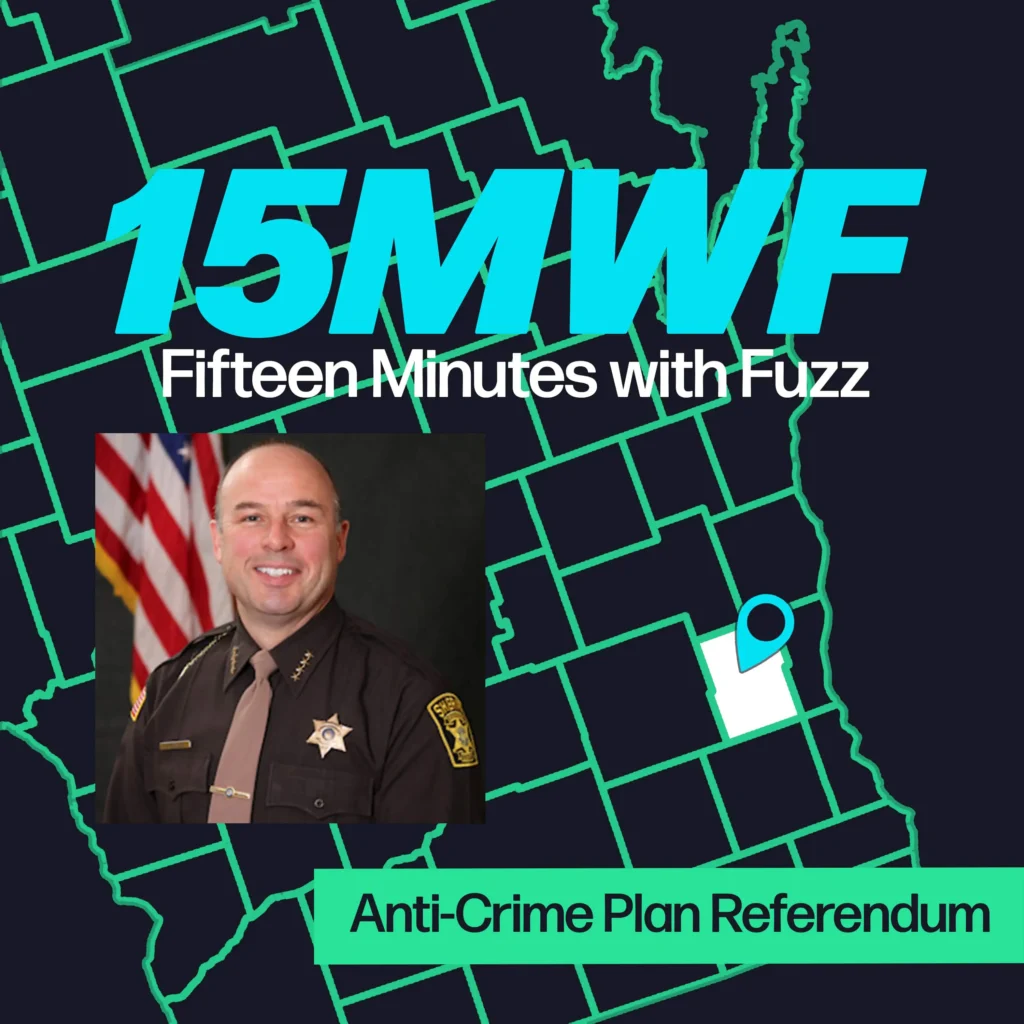There’s another referendum on the ballot on Tuesday, November 8th. The Washington County Anti-Crime Plan Referendum will add staff to the Washington County Sheriff’s Department — including adding patrols to each shift — something that hasn’t happened since the 1980s. Sheriff Martin Schulteis joins me this week to talk about the Anti-Crime Plan Referendum, why it’s needed, what’s at stake, and what to expect if it passes.

Fifteen Minutes with Fuzz
A podcast about positive things happening in and around Washington County, Wisconsin
The Anti-Crime Plan Referendum with Sheriff Martin Schulteis
Transcript
(click to expand)0:09
Hey everybody, thanks for listening to Fifteen Minutes with Fuzz. If you didn’t hear last week, I have moved the show to Tuesdays Yes, we launch on Tuesdays now instead of Mondays because it fits into my life better. Welcome to my life. By the way, my name is Fuzz Martin. And each week, I cover positive things happening in and around Washington County, Wisconsin, I was trying to like cover things that I don’t know about or you might not know about. And this week, that’s one of those things. It’s another upcoming referendum. There are two to four referendums on the November 8 ballot in Washington County, depending on which part of the county you live in, it might be three to four, but it’s definitely two to four. And most of us in the northern half of the county will have the Moraine Park referendum which I covered in last week’s episode. There is a Germantown / Richfield sewer and water referendum. There is a purely political non binding referendum. And then there is the fourth which is the Anti-Crime Plan referendum. Some might say it’s the first and that referendum would increase staffing in the Washington County Sheriff’s Department. Notably, it would increase the number of deputies on patrol, a number of which has not increased since the 1980s. Even though the population the county has grown substantially, and the number of households has doubled. This week, Washington County Sheriff Martin Schulteis joins me to talk about the the anti crime plan details on what we will see if it passes and why the anti crime plan is needed. And with that, here are 15 minutes on the Anti-Crime Plan referendum with Sheriff Martin Schulteis on Fifteen Minutes with Fuzz.2:06
Sheriff Schultz, thanks for joining me today. I appreciate you coming in. I want to talk today about the Anti-Crime Plan that is going to be on the November 8 election referendum if you could give us a bit of a background on the need for this referendum and what people can expect in the bill. I know that’s kind of a broad brush here. But there’s a lot to learn about this. Right?2:28
Sure. Yeah. So it certainly is a big ask. And the county certainly knows that. It’s a $3.6 million referendum where bumps attack. So it’s a one time bump, but it’s a permanent bumpy because we are asking to increase the staffing at the sheriff’s office by 15%, which equates to about 30 and a half full time positions.2:46
staffing at the Washington County Sheriff’s Department has been about the same for years, right, the amount2:52
of deputies that we’ve have on patrol so the deputies that are seen out in the community that really hasn’t changed in the really since the late 1980s. Our department itself has gotten larger we have a bigger jail, we have a bigger detective bureau court security. So we’ve we’ve added personnel, but it’s not really the direct services that the residency and give you an example of that. Sure. So our our staffing minimums on first and third shift, and the late 1980s was five deputies that covered the entire county. So 436 square miles. And it’s really any given given weekend holiday early, that’s the same level of staffing, we increased it on second shift to six deputies. But if you can imagine breaking that down, it’s a large area for them to cover.3:39
Now, since the 1980s, when that level was that same size, pretty close. How much has Washington County grown since then?3:49
Substantially. So the population of back in the late 80s was about 85,000. And now we’re hovering around 135,000. So it’s a sort of the amount of population is about 50,000. And even substantial to that is the number of housing units in that counties as literally doubled in that same amount of time.4:06
Okay, so there’s more households, not quite twice as many people, but that’s because there’s smaller families probably right.4:12
I’m guessing that’s exactly, yeah.4:14
So now the we talk a lot about, you know, crime we’re seeing with drugs and things in our area, especially, you know, fentanyl and some other opioid issues. What are we going to see with if this anti crime plan passes? How is that going to help deter those crimes and help reduce that?4:36
Yeah, that’s an excellent question. So when I started doing these community presentations, we had 25 overdose deaths in Washington County and one is too many. We’re up to now 31 years, not even over and to give you a comparison, in 2019, we had 12. So it’s a substantial jump. Almost 90% of the overdoses are fentanyl related. Okay, that is clearly the problem. So one of the things that we want to One that I really want to address is the sheriff’s office runs a multi jurisdictional drug unit. It’s composed of of several different agencies where the lead agency in it, but one of the things I’d really like to be able to do, one of the positions in this referendum would be assigned to a federal task force. And I told my staff was a little hesitant at first not sure why would want to put county resources into a federal task force, but I actually sat down with the Special Agent in Charge of the federal DEA And he explained that when you have a municipal office or on a federal task force there, the whole design is that they intend they they proactively seek out the high level dealers that are bringing, I call it poison, it’s not even drugs anymore. That’s really what it is into our communities. And the DEA just has a lot more of the deep, deeper pockets and more resources, and we would establish a relationship with the US attorney to pursue these federal charges. And I think there’s that would send a very clear message to individuals that think about bringing stuff into our community6:01
With those fentanyl problems. There’s not just I mean, overdose deaths, of course, are the horrible part of this and ruining families and lives cetera. But there’s more involved with just people doing drugs. There’s also break ins and other types of crime that goes along with that. Is that correct?6:18
Yeah. So I can give you an illustration. We do some interdiction patrols out on 41. Southern part of our county, we don’t do very often. We may be done in the for three or four in the past couple of years. And it’s amazing to me in a four hour interdiction hour, and these are very taxing because it’s a lot of mutual aid and overtime, but the amount of contraband in criminal charges that we see coming into the county, it’s staggering. In fact, one of them we even had the last time was a homicide warrant of individual from walkie that was coming through the county. But because of that main corridor running diagonally across Washington County, the crime is just not isolated to 41, what happens is that people get off and then commit crimes, right off of 41. We’ve seen that time and time again, with vehicle break ins, stolen vehicles from Milwaukee that are dumped off. And then one of our communities cars are taken. And even some more dramatic cases of of home invasions, just just tragic stories. And it’s really all because of the drug trade that’s that’s going on to our south7:21
with this anti crime plan, we would have an increase in the number of patrols that are out how does that increase from that? You said it was 565? Right? First, second, third shift, there’s five, six and five patrol cars, what will we see if this passes,7:36
there’s two kind of aspects to that. So the minimum staffing levels would go from five to eight per shift. So it’d be eight, eight, and actually seven on third shift. And that would allow really, the whole philosophy behind policing is to deter and prevent an officer’s tried to do that when we can. But right now, I think we’re at 34,000 calls for service. And it’s a little tough to do that preventive and proactive stuff when they’re busy going from call to call. But then the other part of that it’s not counting that shift minimum is a mental health team that we would deploy that would be in addition to that staffing level. Okay, God, can8:12
you tell us a bit about what that team would look like? Sure.8:14
Yeah. So and this is not a new model. It wasn’t my idea. It’s a it’s a model that has been gaining traction in Wisconsin, and actually all through the US, but it’s teaming up a law enforcement officer with a clinical social worker in a squad cars, okay, they’re riding around together, it’s probably not a mark squad car that officers probably in uniform or not in uniform. But what it’s designed to do is kind of two things. It’s a, there’s a reactive part of it, if there’s an individual that calls our office and is in a state of crisis, that this team can be dispatched to that residence. And the whole idea is that law enforcement is going to respond first. But we want to get that mental health professional on scene as quick as we can, because they’re trained in it. When we tried to train it, we’re cross trained on so many jack of all trades, master of none to anything, that the mental health professional really could kind of bring down the temperature of that. And so we don’t have those altercations between people that that aren’t well in law enforcement. Then there’s also the proactive part, which I think is just as equally important. And that’s because our mental health professionals in Washington County, they they have a litany of individuals that they know are just kind of on the fringe and have some issues, but may not be in that crisis mode yet. But we want to be able to touch base with those individuals. And just to see how they’re doing to offer direct services, have that mental health professional, develop the relationships as close as we can and are at their front door. And the whole idea is to keep them from going into crisis. So they’re, they’re not having law enforcement contact, they’re not having, you know, having to go through the criminal justice system and they stay out of our jail. That’s not where a lot of these people belong.9:51
Again, it goes back to prevention and instead of that reactionary side of putting somebody in jail, right, absolutely. Now we As in Washington County, I think are very proudly conservative with our pocketbooks. Right? So people are going to want to they need to know going into the polls of what this is going to cost the county and you and a county executive showmen, and others have laid out a very good plan that details exactly what that looks like. Can you give us a bit of what taxpayers can expect if this anti crime plan passes?10:26
Or? Yeah, so I will be the first to admit that the referendum question is not very clear. And it’s the first three words, describe it all under state law. So it’s written for us, we can only insert some of the numbers and what the plan is. But what I can say is, so it’s a $3.6 million bump in the levy levy right now is around 37 million, it would go to a little better than 40 million. And so it’s not an additional 3.6 million every single year, it’s at one time bumped to pay for the 30 positions, the math behind it is very hard to grasp. So we’ll take a median home in Washington counties that will say about $300,000, it’s probably a little less than that. But in that neighborhood, as long as your home was not reassessed last year, or you didn’t do any remodeling to it. So the value of the home was $300,000. Last year, pass or fail, the referendum is going to decrease the tax rate. It’s really a question to constituents, how much do you want it to decrease? So if if the referendum passes, the tax rate will go down? nine cents per 1000. And that equates out of $300,000, home to about $27. So as soon as it goes down, $27 if it fails, it goes down even further than that, it goes down 27 cents per 1000, I believe. Okay. And that equates to have at $1 reduction in your, your county as part of your right, excellent, not the schools and, Mr. Powers, we can’t control that. Sure. But that’s a $54 difference. And it’s still real money to to voters. So that’s why we want to want them to make the decision for us.12:01
But either way, just to restate that again, either way tax that part of the tax levies going down. So whether it passes or not, it’s just a matter of how much goes down so and to go back to what we spoke about at the beginning of the show, is we’ve been at the same staffing levels since on the patrol cars since 1980s.12:21
I started in 1991. And that’s what the staffing levels were in ironically, the sheriff during the late 1980s hadn’t been my father. So I could personally interview him and find out what the staffing levels were. And he confirmed to me that the least 1988 the staffing levels were just the same.12:38
So Sheriff, can you talked about the crime statistics that you’re seeing what kinds of crimes outside and you know, we talked about the drug crimes, but what other things are using12:46
specifically, what I would say is that we are experiencing a lot of out of county crime that are that individuals, I guess I should rephrase that individuals that don’t reside in our county are coming into our county and victimizing our citizens. One of the most telling stats for that as we look at our bookings in our jail every year, and they were, they were down a little bit this past couple of years because of COVID, that normally there are about 4040 500 bookings every single year in our jail. And what we’re learning is that over half of them, those bookings, those individuals don’t reside in Washington County. And so and when you’re talking 2000, that’s 2200 bookings every single year, individuals that are come into our county commit crimes. If it wasn’t for that, we probably wouldn’t have to have a 321 bed jail facility, we could probably be much, much smaller than So it’s13:38
not just even population based on how our county’s population has grown. Now you’re seeing that influx come from other counties, which puts that extra burden on on top of that.13:47
Yeah, absolutely. And I actually even touch base with the the executive director from the National Sheriffs Association, just to get a sense from him, if that’s normal for jails throughout in communities, and they said to have over half of your population from out of county. So that’s, that’s highly unusual. But I would attest that to the fact that we’re near, you know, highly urbanized area.14:06
Are there ways to work with I know you’re working with you were just mentioning working with Milwaukee County on the drug side, but are there ways to work with the other counties to help prevent crime coming through here working together with Milwaukee County, in Waukesha,14:20
We typically the drug task force that I mentioned, and all of those Task Force tried to work together as well. Because quite simply, criminals don’t care what municipality they’re committing the crimes and they, you know, they don’t pay attention to county lines, right. It’s a little boundaries. So you have to have that kind of cooperation. So I always say whether you were brown or blue, we’re all on the same mission. We all have want to keep our community safe. And, and I think we do a real good job.14:46
You had mentioned to me earlier that you’re seeing a lot of increase in Internet Crimes. Can you talk a bit about them?14:51
Sure. Yeah. So there’s a couple of different avenues. The first one is scams, internet based scams, those are absolutely skyrocketing. And the major ones that our major crimes Bureau takes care of, they take anywhere between three to six months and 200 hours to try to get to resolution. And it’s not the manpower that bothers me. We’ve had several cases this year where individuals have lost in the neighborhood of 100,000 $125,000 in their retirement accounts. We do everything in our power to try to intervene and stop the money transfer. And a lot of those stuffs are overseas based so it gets a little little tough, so but those we just see is skyrocketing, not only in terms of the frequency, but the magnitude of what’s really troubling. The other area that we look at, it actually makes me sick to my stomach are we call them everyone refers to it as child porn investigation. It’s called child sexual assault, sexual abuse materials is a term log sure horsemen term, but those types of investigations are constantly going on. And every single municipality in this county, the sheriff’s office is excluded from that. Back, we just kind of looked at our stats last year, it’s a 250% increase in our investigations from last year. Well, those are heavily technology involved, very time consuming, and it can take months to resolve with court subpoenas for for IP addresses. And those are the things that we need to really get on top of is we don’t want those offenders to take that next step from, from the online version to the end.16:25
That’s scary stuff to think about, especially being a father. I know that as part of county executive Sherman’s platform and the county as a whole, it’s always been trying to keep government small. And obviously adding more staff is it’s the opposite of keeping things small. But I know that for County Executive Schoemann and yourself to want to put this forward that there has to be a need, right?16:46
Yeah. So it definitely has two different philosophies kind of conflicting, certainly. So the county historically, you know, our the tax rate has been going down and down. The tax levy is actually lower than what it was. The county itself, workforce is actually shrunk by I think it’s 8% Over the past several years, on a buildings that we own, all that stuff has been shrinking. So we we highly value the the idea of smaller government lower taxes, but then there’s that other contrasting part of the need for public safety. And those two ideas kind of are colliding right now and 15% in our staffing, and that equates to about a 4% total reduction in staff throughout the county through time, but it’s still it’s still growing government. That’s really why we put this out in front of the voters of Washington County to tell us which which one’s more important to17:35
you, as a business owner, I think being right size is important as important as you know, being frugal, right. So being able to serve in your case, your your customers are the constituents of the county and being able to be right sized for this county in that size. We’re where we were in 19. The 1980s is probably would make me feel safer, but everybody gets to make their own decision when they go to the polls on November 8.18:01
And I wish we probably we probably should have been doing these incremental increases over time. I could use the analogy that you know, the best time to plant an oak tree is 40 years ago. Second best time is today. And and I just think that we if I didn’t at least put forth a plan to the constituents of Washington uncounted to have them tell me what level of staffing they want that kind of failing them as their sheriff. So that’s really what this is about is getting the public’s input to see which of those philosophies so we should stress.18:31
Well, Sheriff Schulteis, I appreciate you coming in and I appreciate all that you and your deputies do for and everybody under staff does for the county and for our safety. And again, the referendums coming up on November 8, and hope all goes well.18:46
Alright, thank you very much. I sincerely appreciate the opportunity.18:54
Thank you to Sheriff Schulteis for joining me on this week’s episode. I appreciate him coming in and laying out the details on the anti crime plan referendum, which will be on your Washington County ballot on November 8, 2022. And get more details on the Anti-Crime Plan by going to www and you have to put in the w’s. Otherwise, the site will break. Go to www.washcowisco.gov. The link is front and center on the site. Be sure to put in the w’s again. If you want to go see that and then click on the anti crime plan link which is right at the top of the page. That’ll do it for another episode of Fifteen Minutes with Fuzz. I do appreciate you listening each and every week. New episodes come out every Tuesday. Have an idea for the show. Email me [email protected] and we’ll talk to you next week. Right here on Fifteen Minutes with Fuzz.



